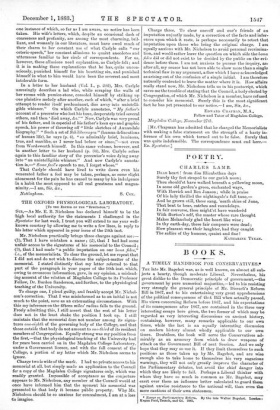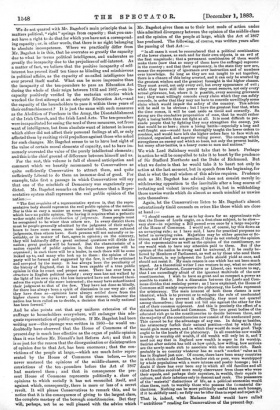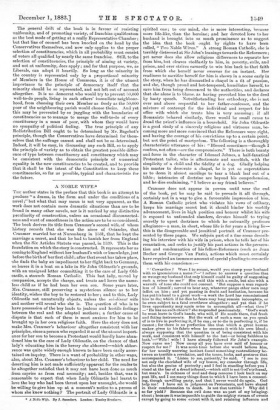BOOKS
A TIMELY HANDBOOK FOR CONSERVATIVES.*
TIIE late Mr. Bagehot was, as is well known, on almost all sub- jects a hearty, though moderate Liberal. Nevertheless, his great dislike to the Democratic principle of government,—the government by pure numerical majorities,—led to his resisting very strongly the general principle of Mr. Disraeli's Reform Bill in 1867, and to his entertaining very great apprehensions of the political consequences of thq Bill when actually passed.. His views concerning Reform before 1867, and his expectations of its consequences after 1867, are contained in the three very interesting essays here given, the two former of which may be regarded as very interesting discussions on ancient history, containing, however, many remarks applicable to our own times, while the last is an equally interesting discussion on modern history almost wholly applicable to our own times. Doubtless, the book will serve the Conservatives ad- mirably as an armoury from which to draw weapons of attack on the Government Bill of next Session. And we only hope that they may so use it. If they limit themselves to such positions as those taken up by Mr. Bagehot, and are wise enough also to take home to themselves his very sagacious warnings, they will not only greatly improve the character of the Parliamentary debates, but avoid the chief danger into which they are likely to falL Perhaps a Liberal thinker with whom they have so much in common as Mr. Bagehot, may exert over them an influence better calculated to guard them against unwise resistance to the national will, than even the mere cautious of their own statesmen.
• Essays on Parliamentary Blom. By the late Walter Bagehot. London: Kegan Paul, Trench, and 0o. 1933.
We do not quarrel with Mr. Bagehot's main principle that in matters political, " right " springs from capacity ; that you can- not have a right to do that for which you have not a correspond- ing capacity ; or, in other words, that there is no right belonging to absolute incompetence. Where we practically differ from Mr. Bagehot is in this, that he overrates so greatly the capacity due to what he -terms political intelligence, and underrates so greatly the incapacity due to the prejudices of self-interest. As a matter of fact, we believe that the positive incapacity of self- interest has proved itself ten times as blinding and mischievous in political affairs, as the capacity of so-called intelligence has ever proved itself useful. What can be more impressive than the incapacity of the ten-pounders to pass an Education Act during the whole of their reign between 1832 and 1867,—an in- capacity positively verified by the sectarian outcries which wrecked the first attempt at an adequate Education Act,—and the capacity of the householders to pass it within three years of their enfranchisement P It is just the same with such measures as the Abolition of Purchase in the Army, the Disestablishment of the Irish Church, and the Irish Land Acts. The ten-pounders were incapacitated for seeing the need of these measures, not from want of intelligence, but from absolute want of interest in issues which either did not affect their personal feelings at all, or only affected them by exciting vivid prejudices against those who asked for such changes. Mr. Bagehot seems to us to have lost sight of the value of certain moral elements of capacity, and to have im- mensely overrated the value of the purely intellectual elements ; and this is the chief ground of difference between himself and us. For the rest, this volume is full of shrewd anticipation and comment which we heartily recommend to Conservatives as quite sufficiently Conservative to attract them, and quite sufficiently Liberal to do them an immense deal of good. For example, take first a passage in which Conservatives will say that one of the mischiefs of Democracy was sagaciously pre- dicted. Mr. Bagehot remarks on the importance that a Repre- sentative system shall represent the real public opinion of the nation :—
" The first requisite of a representative system is, that the repre- sentative body 'should represent the real public opinion of the nation. Nor is this so easy a matter as some imagine. There are nations which have no public) opinion. The having it requires what a pedantic writer might call the coordination of judgments. Some people must be recognised to be wiser than others are. In every district there must be people generally admitted by the judgment of their neigh- bours to have more sense, more instructed minds, more cultured judgments, than others have. Such persons will not naturally or in- evitably, or in matter of fact, agree in opinion ; on the contrary, they will habitually differ : great national questions will divide the nation ; great parties will be formed. But the characteristic of a nation capable of public opinion is, that those parties will be organised, in each there will be a leader, in each there will be some looked up to, and many who look up to them : the opinion of the party will be formed and suggested by the few, it will be criticised and accepted by the many. It has always been the peculiarity of the history of England, that it has been capable of a true public opinion in this its exact and proper sense. There has over been a structure in English political society : every man has not walked by the light of his own eyes ; the less instructed have not deemed them- selves the equals of the more instructed ; the many have subordinated their judgment to that of the few. They have not done so blindly, for there has always been a spirit of discussion in our very air : still they have done so—opinions have always settled down from the higher classes to the lower; and in that manner, whenever the nation has been called on to decide, a decision that is really national has been formed."
And he also points out that any uniform extension of the suffrage to householders everywhere, will endanger this ade- quate representation of public opinion. If Mr. Bagehot had been writing now—this passage was written in 1860—he would un- doubtedly have observed that the House of Commons of the present day is much less effective as the organ of public opinion than it was before Mr. Disraeli's last Reform Act; and that it is so just for the reason that the disorganisation or disintegration
of opinion due to that Act, has been enormous ; that the con- victions of the people at large,—whieh are much better repre- sented by the House of Commons than before, — have never mastered the opinions of the middle-classes, as the convictions of the ten-pounders before the Act of 1867
had mastered them ; and that in consequence the pre- sent House of Commons represents politically a. class of opinions to which socially it has not reconciled itself, and against which, consequently, there is more or less of a secret revolt. It will please Conservatives to remark this, and to notice that it is the consequence of giving to the largest class, the complete mastery of the borough constituencies. But they will, perhaps, not be so well pleased with the advice which
Mr. Bagehot gives them as to their best mode of action nudes this admitted divergency between the opinion of the middle-class and the opinion of the people at large, which the Act of 1867 has produced.. The following, of course, was written years after the passing of that Act:— "In all cases it mast be remembered that a political combination. of the lower classes, as such and for their own objects, is an evil of the first magnitude ; that a permanent combination of them would. make them (now that so many of them have the suffrage) supreme in the country ; and that their supremacy, in the state they now are, means the supremacy of ignorance over instruction and of numbers- over knowledge. So long as they are not taught to act together, there is a chance of this being averted, and it can only be averted by the greatest wisdom and the greatest foresight in the higher classes: They must avoid, not only every evil, but every appearance of evil ; while they have still the power they must remove, not only every. actual grievance, but, where it is possible, every seeming grievance too ; they must willingly concede every claim which they can safely concede, in order that they may not have to concede unwillingly some claim which would impair the safety of the country. This advice- will be said to be obvious ; but I have the greatest fear that, when the time comes, it will be cast aside as timid and cowardly. So strong are the combative propensities of man, that he would rather fight a losing battle than not fight at all. Ibis most difficult to per- suade people that by fighting they may strengthen the enemy, yets that would be so here ; since a losing battle—especially a long and well-fought one—would have thoroughly taught the lower orders to. combine, and would have left the higher orders face to face with an irritated, organised, and superior voting power. The courage which strengthens an enemy and which so loses, not only the present battle, but many after-battles, is a heavy curse to men and nations."
We wish Lord Salisbury would take that to heart. Perhaps, in action he will be compelled to take it to heart by the prudence. of Sir Stafford Northcote and the Duke of Richmond. But what we desire is that he would take it to heart not only in, action at the last moment, but in speech from the beginning, for that is what the real wisdom of this advice requires. Prudence such as Mr. Bagehot has advised does not consist merely in. withdrawing opposition to the inevitable after a long course of irritating and violent invective against it, but in withholding those unwise words which do almost as much mischief as unwise acts themselves.
Again, let the Conservatives listen to Mr. Bagehot's almost ostentatiously timid counsels on crises like those which are close- at hand :—
" I should venture so far as to lay down for an approximate rule- that the House of Lords ought, on a first-class subject, to be slow— very slow—in rejecting a Bill passed even once by a large majority of the House of Commons. I would not, of course, lay this down as an unvarying rule; as I have said, I have for practical purposes no- belief in unvarying rules. Majorities may be either genuine or fic- titious, and if they are not genuine, if they do not embody the opinion of the representative as well as the opinion of the constituency, no- one would wish to have any attention paid to them. But if the' opinion of the nation be strong and be universal, if it be really be- lieved by Members of Parliament, as well as by those who send them to Parliament, in my judgment the Lords should yield at once, and. should not resist it. My main reason is one which has not been much urged. As a theoretical writer I can venture to say, what no elected, Member of Parliament, Conservative or Liberal, can venture to say,. that I am exceedingly afraid of the ignorant multitude of the new constituencies. I wish to have as great and as compact a power as possible to resist it. Bat a dissension between the Lords and Com- mons divides that resisting power ; as I have explained, the Holum of Commons still mainly represents the plutocracy, the Lords represents the aristocracy. The main interest of both these classes is now identical, which is to prevent or to mitigate the rule of uneducated numbers. But to prevent it effectually, they must not quarrel- among themselves ; they must not bid one against the other for the aid of their common opponent. And this is precisely the effect of a, division between Lords and Commons. The two great bodies of the- educated rich go to the constituencies to decide between them, and the majority of the constituencies now consist of the uneducated poor. This cannot be for the advantage of any one. In doing so besides, the aristocracy forfeit their natural position—that by which they would gain most power, and in which they would do most good. They, ought to be the heads of the plutocracy. In all countries new wealth is ready to worship old wealth, if old wealth will only let it, and I' need not say that in England new wealth is eager in its worship. Satirist after satirist has told us how quick, how willing, how anxious are the newly-made rich to associate with the ancient rich. Rank probably in no country whatever has so much 'market' value as it has in England just now. Of course, there have been many countries in which certain old families, whether rich or poor, were worshipped by whole populations with a more intense and poetic homage ; but I doubt if there has ever been any in which all old families and all titled families received more ready observance from those who were their equals, and perhaps their superiors, in wealth, their equals in culture, and their inferiors only in descent and rank. The possessors. of the material' distinctions of life, as a political economist would. class them, rush to worship those who possess the immaterial dis- tinctions. Nothing can be more politically useful than such homage, if it ha skilfully used ; no folly can be idler than to repel and reject it."
That is, indeed, what Madame Mohl would have calla " nutritious " reading for Conservatives of the present day.
The general drift of the book is in favour of resisting uniformity, and of promoting variety, of franchise-qualification as the best mode of getting at a really Representative Chamber ; but that line of counsel has been knocked on the head by the Conservatives themselves, and now only applies to the proper selection of constituencies, which in all probability must consist of voters all qualified by nearly the same franchise. Still, to the selection of constituencies, the principle of aiming at variety, and not at uniformity, does apply; and for that purpose, we, as Liberals, can adopt it heartily. So long as the minority in the country is represented only by a proportional minority of Members in the House of Commons, it is of the utmost importance to the principle of democracy itself that the minority should be so represented, and not left out of account altogether. It is no democrat who would try to prevent 50,000 well-to-do people, living in each others' immediate neighbour- hood, from choosing their own Member as freely as the 50,000 poor of the neighbouring parish would choose theirs. And yet this may be prevented by so juggling with the boundaries of constituencies as to manage to merge the well-to-do of every constituency in a mass of poor, with whom they would have no sympathy of political feeling. The true principle of any Redistribution Bill ought to be determined by Mr. Bagehot's principle, though the Conservatives have determined for them- selves that the suffrage cannot and shall not be so determined. Indeed, it will be easy, in discussing any such Bill, so to apply the principle of variety as to obtain the greatest possible differ- ence of type between constituency and constituency which may be consistent with the democratic principle of numerical equality in the new constituencies to be created, and to provide that it shall be the intent of the Constitution to keep these constituencies, so far as possible, typical and characteristic for the future.








































 Previous page
Previous page